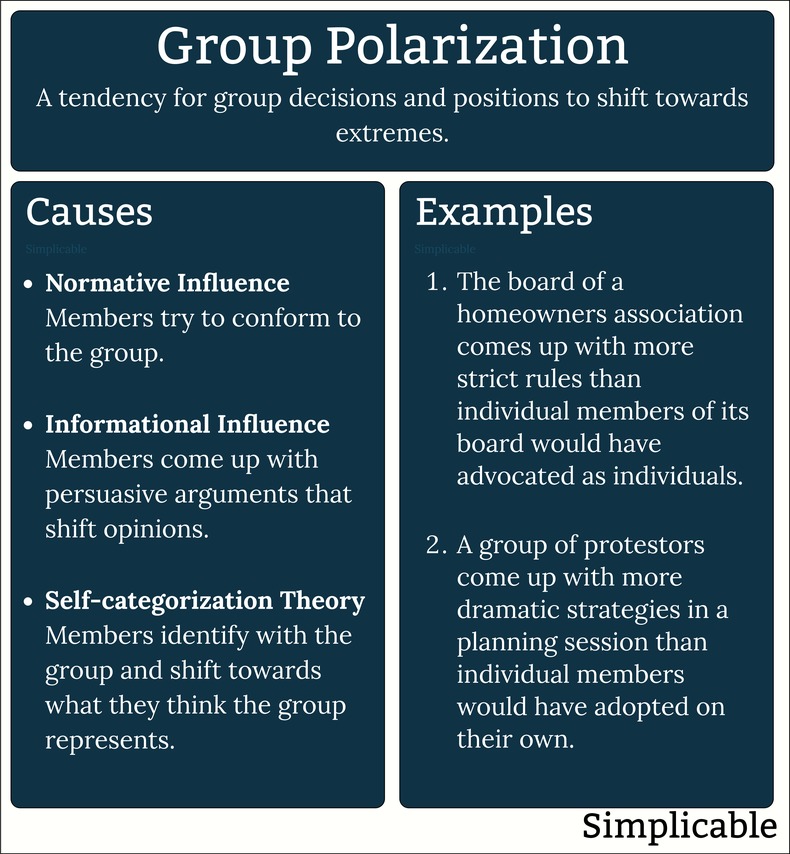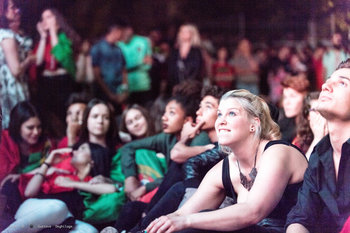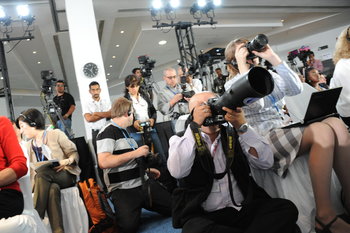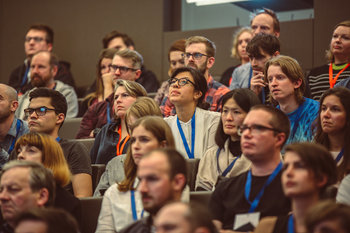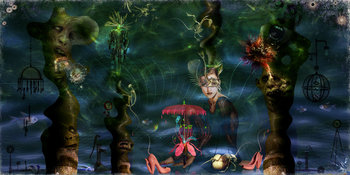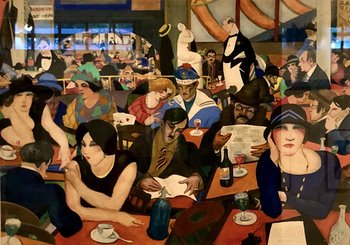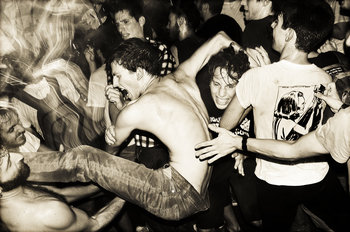|
| |
Group polarization is the tendency for groups to make decisions that are more extreme than the initial opinions of group members. In other words, the process of group decision making tends to shift opinions towards extremes. The following are examples of group polarization.Risk ShiftGroup polarization can drive shifts towards greater risk or more intensive risk-reduction than individuals would be inclined to see as rational before participating in the group. For example, nine board members of a homeowner association are concerned with noise levels from a park. However, none of these members individually sees a need to restrict sports in the park. Nevertheless, they meet to decide how to address noise from the park and somehow decide to ban sports in the park.
Group AmplificationGroups appear to amplify the initial tendencies of members. For example, protestors who design signs for a protest individually might come up with relatively tame messages. If they meet as a group to design these signs, group polarization would predict the messages on the signs become more dramatic.Normative InfluenceThe theory that group polarization occurs because members of the group try to shift towards what they think the group wants of them in order to gain social acceptance. For example, if a group of snowboarders meet to discuss a video production everyone may try to think of super risky stunts because they think this will impress the group.
Informational InfluenceThe theory that group polarization occurs because members come up with persuasive arguments that cause everyone in the group to become more convinced of increasingly strong positions.Social SalienceMembers of the group with the most dramatic arguments may be the most noticeable and may stand out and lead the group towards a more dramatic position. For example, a parent-teacher association where if you say something completely reasonable people don't listen but if you say something emotionally charged you get attention.Self-categorization TheoryThe theory that people try to conform to what the group represents such that they aren't themselves but try to emulate what group membership means. For example, members of a homeowner association who view this as being a conservative type of organization such that they try to conform to conservative thinking.Political PolarizationA tendency for politics to shift towards an us versus them mentality whereby political views organize into two bitterly divided camps with an emotional dislike of one another. This emotional aspect can cause both sides to adopt increasingly irrational positions that are simply designed to annoy the other side.GroupthinkGroupthink is a group that demands ideological conformance whereby individuals who do not conform will be attacked or isolated by the group. In this context, members may practice self-censorship whereby they fear to say what they really think and the group shifts towards the strongest possible representations of its ideology.Filter BubblesMedia that allows individuals to tune into viewpoints that conform to their own. This resembles an echo chamber whereby your opinions are echoed back to you so that you can strengthen your position and overestimate how accepted this viewpoint actually is in the real world. Filter bubbles are essentially digital groups that are particularly susceptible to group polarization due to their closely aligned opinions.Abilene ParadoxAbilene paradox is when a group makes a decision that each individual member of the group views as fully irrational. Group polarization is one of the many ways that this can occur. For example, members of a band meet to discuss problems with security at their last concert. They decide to cancel the next show but each individual member of the group views this as going too far.Problem FamiliarityWell-established groups that are familiar with the problem space are far less prone to group polarization. If you have five snowboarders who meet to discuss a video production for the first time, they may come up with wild ideas. However, if this group has been working together for years and has produced dozens of videos, this may moderate towards greater pragmatism for what can actually be done.Design by CommitteeGroup polarization isn't an uncontested theory. It has been empirically confirmed that it does occur. However, this doesn't make it a universal feature of groups. For example, the well known group behavior known as design by committee whereby groups tend to move toward mediocrity in planning and design tasks.SummaryGroup polarization is the tendency for groups to shift to a more extreme position than the initial opinions of members. It has been empirically confirmed that this does occur but this doesn't make it a universal feature of groups. Competing hypotheses such as design by committee indicate groups are also capable of irrationally mediocre and unremarkable decisions.Next read: Groupthink
Groupthink
This is the complete list of articles we have written about groupthink.
If you enjoyed this page, please consider bookmarking Simplicable.
© 2010-2023 Simplicable. All Rights Reserved. Reproduction of materials found on this site, in any form, without explicit permission is prohibited.
View credits & copyrights or citation information for this page.
|
